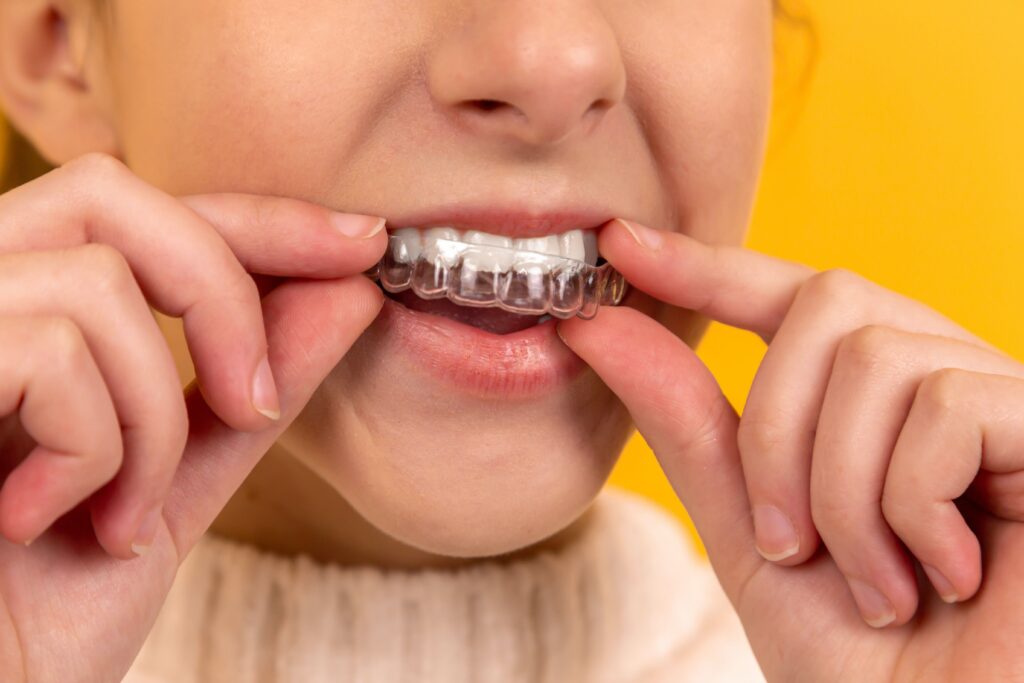
Before we delve into TMJ remedies, it’s crucial to understand what TMJ disorder is, its symptoms, and potential causes. This awareness can help you manage the condition more effectively and seek appropriate treatment methods.
TMJ stands for temporomandibular joint, the hinge-like structure that connects your jawbone to your skull. TMJ disorder, also known as temporomandibular joint dysfunction, refers to a range of conditions that can cause pain and dysfunction in the jaw joint and the muscles that control jaw movement. It’s a common condition that can significantly impact an individual’s quality of life.
The signs of TMJ disorder can vary widely, but some of the most common symptoms include:
If you’re experiencing any of these symptoms, it’s essential that you consult with a healthcare professional for a proper diagnosis. For more information on TMJ symptoms, you can read our comprehensive guide on tmj symptoms.
The exact cause of TMJ disorder is often difficult to determine. It can be attributed to various factors such as genetics, arthritis, or jaw injury. In some cases, the disorder may arise from behaviors like teeth grinding or clenching, which put undue stress on the joint.
However, it’s important to note that many people who exhibit these behaviors do not develop TMJ disorder. Similarly, some individuals with the disorder do not grind their teeth, and have no history of jaw injuries or other issues. Therefore, the relationship between these factors and TMJ disorder is not always clear.
Understanding TMJ disorder is the first step towards finding effective TMJ remedies. By recognizing the symptoms and potential causes, you can make informed decisions about your treatment options. For more in-depth information on TMJ causes, you can refer to our article on tmj causes.
For those struggling with TMJ disorder, there are various non-medical TMJ remedies that can provide significant relief from jaw pain and discomfort. These include lifestyle changes, physical therapy, and home remedies.
Certain lifestyle modifications can aid in alleviating the symptoms of TMJ disorder. These changes primarily involve avoiding activities that may strain the jaw muscles.

Physical therapy can be an effective way to relieve TMJ pain. Physical therapists can provide exercises and techniques to stretch and strengthen the jaw muscles, improve posture, and promote better jaw alignment. For example, TMJ stretches can help ease tension in the jaw and improve its range of motion. Visit our article on TMJ physical therapy for a detailed guide on exercises and techniques.

There are several home remedies that can help manage TMJ symptoms:
Remember, these non-medical TMJ remedies should be used in conjunction with a comprehensive treatment plan provided by a healthcare professional. Always consult with a TMJ specialist before starting any new treatments. For more information on TMJ disorder and its various treatment options, visit our detailed guide on TMJ treatment.
For some individuals, non-medical remedies may not be sufficient to alleviate the symptoms of TMJ disorder. In such cases, medical interventions, ranging from medications to surgical procedures, can provide effective relief.
Medications are often the first line of treatment for TMJ pain. Over-the-counter anti-inflammatory drugs and pain relievers can help reduce swelling and alleviate discomfort. If these are not effective, your doctor may prescribe stronger pain medications, muscle relaxants, or anti-anxiety drugs to help relax your jaw muscles.
| Medication Type | Purpose |
|---|---|
| Over-the-counter pain relievers | Alleviate mild TMJ pain |
| Prescription pain relievers | Treat severe TMJ pain |
| Muscle relaxants | Relax the jaw muscles |
| Anti-anxiety drugs | Reduce tension in the jaw |
For more information on the types of medications used to treat TMJ disorder, check out our article on tmj medication.

If medications do not provide sufficient relief, your healthcare provider may recommend non-surgical procedures. These can include oral splints or mouth guards, often used for individuals who clench or grind their teeth. Physical therapy can also be beneficial, with exercises to stretch and strengthen the jaw muscles.
| Non-Surgical Procedure | Purpose |
|---|---|
| Oral splints or mouth guards | Prevent teeth grinding and clenching |
| Physical Therapy | Strengthen jaw muscles |
For a comprehensive guide on physical therapy exercises for TMJ disorder, visit our page on tmj physical therapy.
In severe cases of TMJ disorder where other treatments have been unsuccessful, surgical interventions may be considered. These include arthrocentesis, arthroscopy, and open-joint surgery. It’s important to note that these procedures carry potential risks and should be considered only after thorough discussion with your healthcare provider.
| Surgical Procedure | Purpose |
|---|---|
| Arthrocentesis | Remove debris and inflammatory by-products |
| Arthroscopy | Repair or remove damaged tissue |
| Open-joint surgery | Repair or replace the joint |
For more information on surgical procedures for TMJ disorder, visit our page dedicated to tmj surgery.
Remember, each person’s experience with TMJ disorder is unique, and what works for one person may not work for another. It’s important to work closely with your healthcare provider to find the tmj remedies that work best for you.
In addition to medical treatments, there are also several complementary and alternative remedies that can help alleviate the discomfort associated with TMJ disorder. These include acupuncture, biofeedback, and changes in nutrition and supplements.
Acupuncture is a traditional Chinese medicine practice that involves inserting thin needles into specific points on the body. It’s believed that this can help to balance the body’s energy flow, reduce pain, and promote healing.
For individuals suffering from TMJ disorder, acupuncture can serve as a potential remedy by focusing on specific points around the jaw, head, and neck. These points are believed to be connected with the temporomandibular joint, and stimulating these points can help to relieve pain and muscle tension.
It’s important to note that while acupuncture can provide temporary relief from TMJ pain, it’s not a permanent cure. It should be used as a complementary treatment in conjunction with other TMJ therapies. For more information on acupuncture for TMJ, visit our tmj acupuncture page.
Biofeedback is a technique that helps individuals gain control over their body’s functions. For TMJ disorder, biofeedback specifically targets the jaw muscles and aims to reduce muscle tension and clenching, which are common symptoms of TMJ disorder.
During a biofeedback session, sensors are placed on the jaw muscles to monitor their activity. This information is then displayed on a screen, allowing individuals to see when their muscles are tense and learn how to relax them.
Biofeedback can be a powerful tool for managing TMJ pain, particularly for those who tend to clench their jaw or grind their teeth. To learn more about this treatment option, check out our page on tmj therapy.
Dietary changes and supplements can also play a role in managing TMJ symptoms. Anti-inflammatory foods such as omega-3 fatty acids, green leafy vegetables, and berries can help to reduce inflammation in the jaw joint.
In addition to a healthy diet, some individuals may benefit from certain supplements. For instance, magnesium supplements can help to relax the muscles and reduce jaw tension. Vitamin D can help to promote bone health, which can be particularly beneficial for those with TMJ disorder.
Remember, before starting any new supplement regimen, it’s important to consult with a healthcare provider. They can provide personalized recommendations based on your specific needs and medical history.
By exploring a variety of complementary and alternative treatments, we can better manage the symptoms associated with TMJ disorder. Whether it’s acupuncture, biofeedback, or dietary changes, these remedies can provide much-needed relief and improve quality of life for those dealing with this condition. For more information on available TMJ remedies, visit our tmj remedies page.
While seeking TMJ remedies is important for those already experiencing the discomfort of this condition, taking steps to prevent TMJ Disorder can go a long way in maintaining good jaw health. Here, we explore prevention methods including jaw exercises, stress management, and proper posture and ergonomics.
Jaw exercises can help strengthen the muscles around the jaw and enhance flexibility, potentially warding off TMJ Disorder. They can also promote healing and alleviate discomfort for those already dealing with this condition.
For example, one simple exercise involves opening the mouth wide and then slowly closing it. Another involves moving the jaw gently from side to side. Yet another exercise involves placing the tip of the tongue on the roof of the mouth and then slowly opening and closing the mouth. For a comprehensive guide on jaw exercises, visit our article on tmj exercises.
Stress can lead to clenching and grinding of the teeth, behaviors that can put undue strain on the jaw and potentially lead to TMJ Disorder. As such, managing stress is a crucial part of preventing this condition.
Stress management techniques can vary greatly depending on personal preference. Some people might find relief through methods like yoga, meditation, or deep breathing exercises. Others might benefit from counseling or cognitive-behavioral therapy. It may be beneficial to explore different stress management techniques to find what works best for you.
Poor posture can place unnecessary strain on the neck, shoulders, and jaw, potentially leading to TMJ Disorder. As such, maintaining good posture is a crucial part of prevention.
This might involve adjusting your work station to ensure your computer is at eye level and your chair is at the right height. It’s also important to take regular breaks to stretch and prevent muscle stiffness.
Furthermore, when using a phone, try to avoid cradling it between your ear and shoulder, as this can strain the neck and jaw. If you frequently use a phone for work, consider using a headset or speakerphone instead.
In conclusion, while TMJ Disorder can be a painful and frustrating condition, there are actions we can take to prevent it. By incorporating jaw exercises into our daily routine, managing stress, and maintaining proper posture and ergonomics, we can potentially ward off TMJ Disorder and maintain good jaw health. For more information on this condition and available remedies, visit our tmj disorder article.